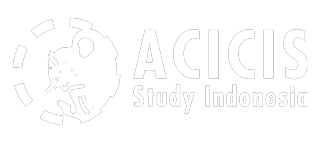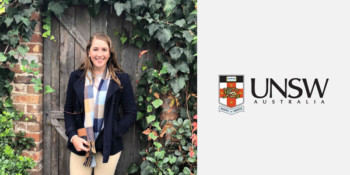Kylie Lynch is a participant in the 2019 Journalism Professional Practicum from the University of New South Wales. Kylie is studying a Bachelor of Media majoring in Journalism and Communications. She received a $3,000 New Colombo Plan Mobility Grant to support her participation in this program.
Q: Why did you decide to undertake the ACICIS program?
I chose to undertake the ACICIS practicum to gain work experience in Indonesia, a country foreign to me despite its important ties to Australia. Not only did I want to broaden my professional experience, I also knew this program would enable me to immerse myself in a new culture and gain the independence that an Australian-based internship could not provide me with.
Q: Did you receive a New Colombo Plan Mobility Grant? If so, how did this contribute to your experience in Indonesia?
I did receive the New Colombo Plan Mobility Grant, and without that financial support I would not have been able to partake in this unique experience due to financial constraints. So, I would like to take this opportunity to thank the Australian Government for this funding and I hope that it continues to give young Australians an opportunity to gain experience in the Indo-Pacific area and, by extension, strengthen ties between the two countries and further solidify their future relationship.
Q: How will the Professional Practicum benefit or influence your future career?
I gained an unprecedented amount of knowledge on the Indonesian social, economic and political environment by some of the most influential journalists, foreign correspondents and activists in Indonesia. This access, and the contacts that provided these insights, could not have been gained outside this program, and will be extremely beneficial for my future career. I feel as though I have been given the ‘Golden Ticket’ into the Indonesian media world, to which I am extremely grateful. This is definitely the most beneficial program I have been a part of and I could not recommend it highly enough to any Australian student wishing to gain exposure to the media industry in a foreign country.
Q: What organisation did you intern with? (Explain your roles and responsibilities)
I was lucky enough to intern at the United Nations Information Centre. Before this, I had zero experience in the communications side of the industry. However, my supervisor ensured that I hit the ground running, being given various tasks – many with more responsibility than I ever anticipated – yet this ensured that I gained the most I could in the four short weeks I was interning there. Some of these roles included gathering and disseminating Indonesian news to relevant stakeholders, helping redesign UN Indonesia’s new website, producing and editing reports around the Sustainable Development Goals (SDGs) that were published on the organisation’s website and developing a document on the current media landscape of Indonesia, which was then used for implementing a more effective communications strategy targeted at Indonesia. I was in charge of tailoring a campaign around university students to increase their awareness and action around the SDGs, which included creating PowerPoints, activities and fact sheets on the issues the SDGs cover. Additionally, I attended and organised numerous meetings with directors of private media companies who we were trying to recruit to our organisation’s Media Compact around increasing the awareness of SDGs in an editorial and corporate sense.
Q: How have you found the work culture of your host organisation? How is it different to work experience in Australia?
While there were a few initial cultural barriers in my team, mainly due to minor miscommunications, I immediately felt like I was a part of the team and became passionate in the work I was producing. This was due to the rich work culture where everyone took pride in the work they were doing, knowing that it was for a worthy cause of building a better and more sustainable future. The culture differed a lot from the Australian work culture where interns are often considered insignificant and given basic admin work. In Indonesia, however, my fellow JPP friends and myself constantly commented on how we always felt like part of the team and how people in senior positions would go out of their way to ensure this. In my experience, my supervisor would introduce me as her ‘colleague’ rather than her ‘intern’ in meetings which demonstrates the higher level of respect that the Indonesian work culture accords to Interns compared to many Australian workplaces.
Q: Would you like to return to work in Indonesia again in future?
At the completion of my 4 weeks at UNIC, I was fortunate enough to be offered a 12-month internship as UNIC’s ‘Media Engagement Officer’. I will be returning to Jakarta in June to start this 12-month placement. I never even considered a future in Communications, thinking that I would only be going down a journalism-related career path. Now I am packing my bags to go over to Indonesia for 12 months to start a new career!
Q: What do you like to do in your spare time in Indonesia?
I met the most amazing bunch of people on this practicum, many of whom will be life-long friends. As such, every spare minute we had would be spent either having drinks at the bar after work or travelling around on the back of motorcycles and trying different kinds of local food while we were there.
Q: Favourite Indonesian word/phrase?
Hati-hati – “be careful” – extremely useful in many situations, whether the Rendang was too spicy or your GoJek driver was thinking he was trying to qualify for the Isle of Man TT race.
Q: Favourite place to eat? Favourite Indonesian food?
Sudirman Park Padang restaurant. My favourite food is just too hard to narrow down. So, my top three would be Rendang, Gado Gado and Martabak.
Q: What places in Indonesia have you visited during your practicum so far?
On weekends, we went all around Jakarta, Bandung and Yogakarta. A must see is Bantar Gebang, South-East Asia’s largest open landfill located in Bekasi. It’s phenomenal seeing how the people there live and seeing the progress of the BGBJ program that helps educate local children to improve their futures and break the cycle of poverty.


